
The lesser spotted woodpecker is a member of the woodpecker family Picidae. It was formerly assigned to the genus Dendrocopos. Some taxonomic authorities continue to list the species there.

The Thomisidae are a family of spiders, including about 170 genera and over 2,100 species. The common name crab spider is often linked to species in this family, but is also applied loosely to many other families of spiders. Many members of this family are also known as flower spiders or flower crab spiders.

Gallinago is a genus of birds in the wader family Scolopacidae, containing 18 species.

Velvet spiders are a small group of spiders almost entirely limited to the Old World, with the exception of one species known from Brazil. In Europe, some are commonly called the ladybird spiders.

Opilio is a genus of harvestmen with 35 known species.
Squalus is a genus of dogfish sharks in the family Squalidae. Commonly known as spurdogs, these sharks are characterized by smooth dorsal fin spines, teeth in upper and lower jaws similar in size, caudal peduncle with lateral keels; upper precaudal pit usually present, and caudal fin without subterminal notch. In spurdogs, the hyomandibula is oriented at a right angle to the neurocranium, while in other sharks, the hyomandibula runs more parallel to the body. This led some to think that the upper jaw of Squalus would not be as protractile as the jaws of other sharks. However, a study that compared different jaw suspension types in sharks showed that this is not the case and that Squalus is quite capable of protruding its upper jaw during feeding.

Diaptomus is a genus of copepods with a single eye spot. It is superficially similar in size and appearance to Cyclops. However it has characteristically very long first antennae that exceed the body length. In addition, the females carry the eggs in a single sac rather than the twin sacs seen in Cyclops. It is a copepod of larger freshwater ponds, lakes and still waters.
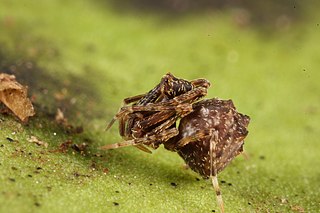
Archaeidae, also known as assassin spiders and pelican spiders, is a spider family with about ninety described species in five genera. It contains small spiders, ranging from 2 to 8 millimetres long, that prey exclusively on other spiders. They are unusual in that they have "necks", ranging from long and slender to short and thick. The name "pelican spider" refers to these elongated jaws and necks used to catch their prey. Living species of Archaeidae occur in South Africa, Madagascar and Australia, with the sister family Mecysmaucheniidae occurring in southern South America and New Zealand.
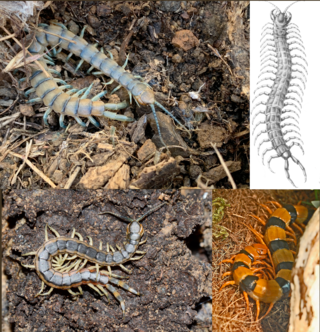
Scolopendra is a species-rich genus of large tropical centipedes of the family Scolopendridae.

The Phalangiidae are a family of harvestmen with about 380 known species. The best known is Phalangium opilio. Dicranopalpus ramosus is an invasive species in Europe.

Clanculus is a genus of sea snail, marine gastropod molluscs of the family Trochidae, the top shells.

Labyrinthus is a genus of air-breathing land snails, terrestrial pulmonate gastropod mollusks in the family Labyrinthidae.

Fusus is a genus of small to large sea snails, marine gastropod molluscs in the family Fasciolariidae, the spindle snails and tulip snails.
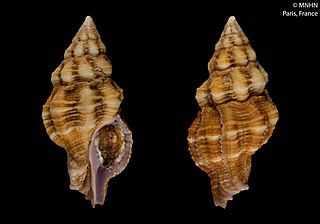
Latirus is a genus of sea snails, marine gastropod molluscs in the family Fasciolariidae, the spindle snails, the tulip snails and their allies.
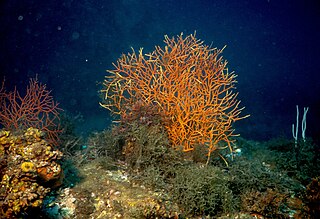
Leptogorgia is a genus of soft coral in the family Gorgoniidae. The genus has a widespread distribution with members being found in the eastern Atlantic Ocean from Western Europe to South Africa, the Mediterranean Sea, the Atlantic coasts of North and South America, the Antilles and the Pacific coast of America. Species are found in both shallow and deep waters.
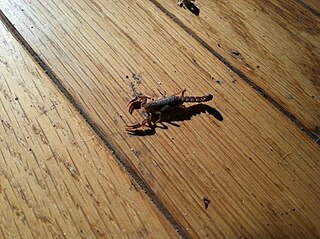
Vaejovis is a genus of scorpions.
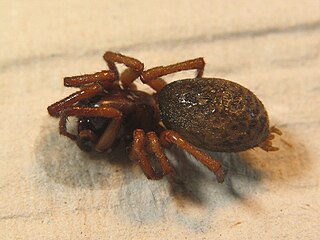
Inermocoelotes is a genus of funnel weavers first described by S. V. Ovtchinnikov in 1999.
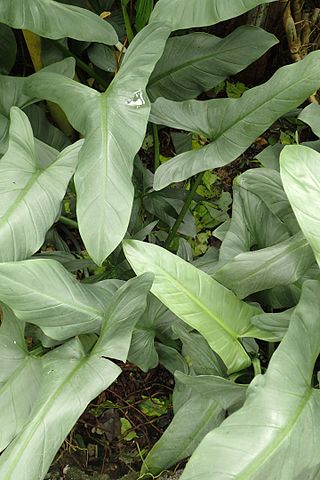
Philodendron hastatum is a species of plant in the genus Philodendron. The species has previously been known by synonyms such as Philodendron domesticum or other names, a confusion made worse by the large degree of morphological variation in this and similar Philodendrons. Commonly known as the silver sword philodendron, the plant is known for its silvery coloration, especially in juvenile leaves.

Euceraphis is a genus of true bugs belonging to the family Aphididae.
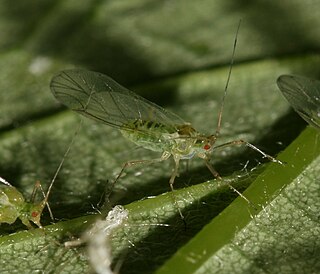
Drepanosiphum platanoidis is a species of insect, commonly known as the sycamore aphid. It undergoes both parthenogenic and sexual reproduction.



















